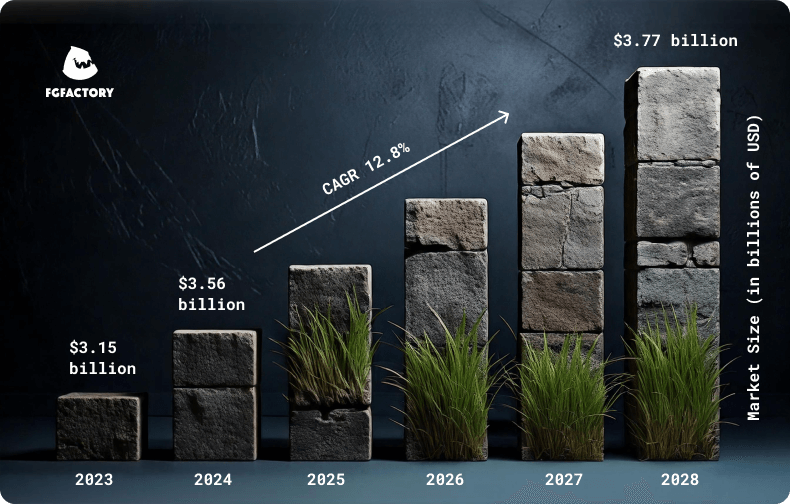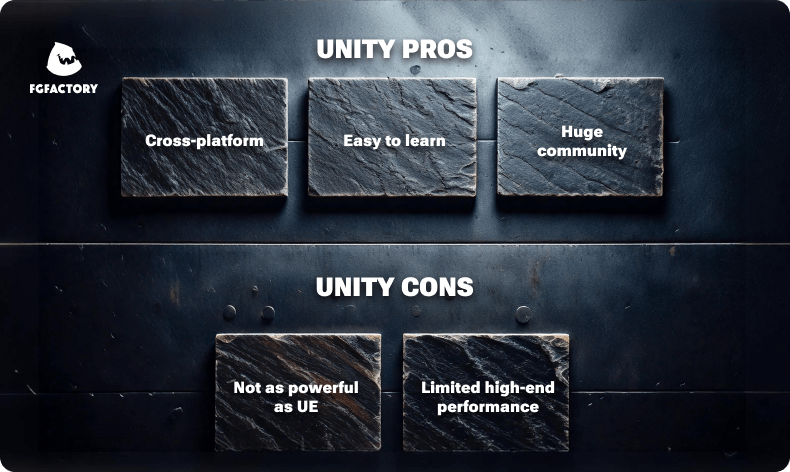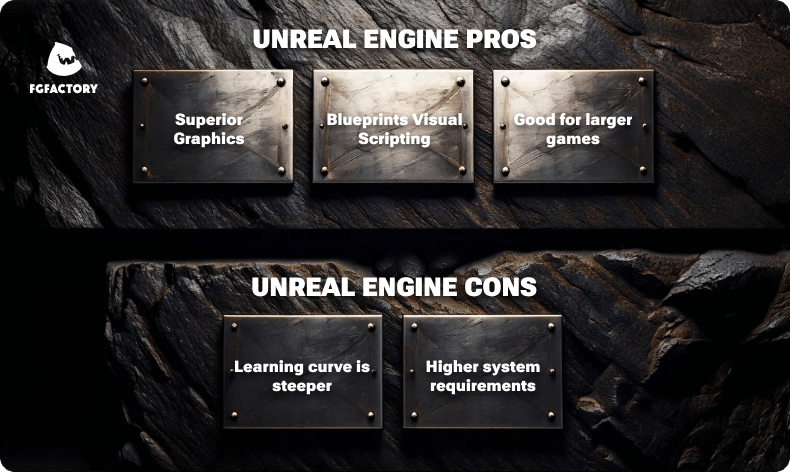
Choosing a Game Engine: Unity vs Unreal Engine

In the game development world, Unity vs Unreal Engine stands as one of the most frequent debates. These two engines dominate the industry, each bringing unique strengths to the table.
Unity, known for its ease of use and versatility, has a large following among indie developers and those focused on 2D or mobile games.
Unreal Engine, on the other hand, is renowned for its high-quality graphics and powerful performance, making it a favorite among AAA studios and developers crafting graphically intensive games.
As the gaming industry expands and technology advances, the demand for flexible and powerful game engines is also on the rise. This growth is reflected in the game engine market itself, which, according to The Business Research Company, is projected to grow from $3.15 billion in 2023 to $5.77 billion in 2028, with a compound annual growth rate (CAGR) of 12.8%.

The article looks into the primary traits, similarities and differences between Unity and Unreal Engine. It offers suggestions regarding which one to select over the other in certain scenarios. Both these engines are widely used by Australian game development studios, contributing significantly to the global gaming market. In Australia, more and more studios are using Unity and Unreal for mobile, VR, and AAA work. It is very important for developers in this area, as well as globally to learn these tools.
What is Unity Engine?

Unity engine is well-liked and very popular in the gaming development universe, especially with indie creators. The reason many prefer Unity when deciding between Unity vs Unreal Engine is because of its simple use, large variety of assets and excellent support for different platforms. Also, Unity’s interface that is easy to understand coupled with detailed documents make it a suitable option not only for experts but newcomers as well in this field.
Unity has much range, it can be used for 2D and also 3D game production. It is possible to create games for mobile devices, personal computers, gaming systems and even virtual reality platforms with Unity. Its adaptability is shown in many types of uses from simple mobile games up to more complex 3D experiences. Games such as Monument Valley or Cuphead display what Unity can do for design of a 2D game while Pokémon Go shows the strength of Unity in augmented reality along with gaming on mobiles. For people thinking about Unity or Unreal Engine for various uses, Unity often comes out as a proper option.
What is Unreal Engine?

Unreal Engine, developed by Epic Games, has a legacy stretching back to 1998, originally created for the classic shooter Unreal. Over the years, it has evolved beyond its initial design, transforming into a versatile tool used for developing a wide range of games. Today, it stands as a powerhouse in the industry, known for producing high-quality, photo-realistic visuals that appeal to both top-tier gaming studios and indie developers alike.
One of the unique advantages Unreal Engine offers is its Blueprints Visual Scripting system. This feature allows developers to craft detailed game mechanics without needing in-depth programming skills, making the discussion of Unreal Engine vs Unity for beginners particularly relevant.
Did You Know?
Unity and Unreal Engine power over 80% of games worldwide! Unity dominates the mobile game market, with nearly 50% of mobile games created using its platform, while Unreal Engine excels in AAA titles, known for its stunning graphics in games like Fortnite and Gears of War. Whether you’re developing a simple 2D mobile game or a high-end VR experience, choosing Unity or Unreal Engine can make a world of difference in your game’s reach, performance, and visual quality.
Similarities Between Unity and Unreal Engines

While Unity and Unreal Engine feature some unique characteristics, both hold several shared benefits that contribute to their popularity in the game development industry.
Cross-platform
Each engine gives multiple platform support, allowing makers to create games for mobile, desktop, console and Internet platforms. This offers the flexibility to make different types of gaming experiences. The cross-platform availability feature indicates that developers can aim at broader audiences without needing to rebuild their games on every single platform. Our insights “Desktop games development with Unreal Engine” highlights how Unreal Engine optimizes performance and visuals for desktop gaming, offering developers advanced tools to create rich, interactive projects on powerful hardware.
Huge community
An important similarity is noticeable in their strong communities. Unity and Unreal both have big user groups that provide active forums, guides and web resources for developers of all levels of experience. This kind of community support is very valuable, especially when deciding between Unreal Engine vs Unity for beginners because it gives a simple way to find answers, learn new things as well as the opportunity to collaborate which could help both novices and experts alike.
Unity vs Unreal Engine: Key Differences

For making a choice between Unity and Unreal Engine, it is very important to know the main differences. Both engines provide strong tools, but there are big changes on many points. This is a deep view to assist developers in picking what works better for their project.
Which Engine is More Beginner-Friendly?
Unreal Engine vs Unity for beginners often shows that Unity is easier to start with. The straightforward interface of Unity and its detailed guidebook make it great for beginners who are starting to create games. C# the scripting language in Unity is usually easier to understand compared to the C++ used in Unreal Engine. But, Unreal has a Blueprints Visual Scripting feature that allows beginners to create game logic without needing advanced coding skills. It provides a visual way to explore game design without digging deeply into coding.
Comparing Graphical Fidelity and Visual Effects
When comparing Unreal Engine vs Unity about graphics quality, often people see Unreal Engine is better. This is because it has more advanced ability in rendering, which makes it possible to create very detailed and real-looking visuals. So, many big AAA games that need good cinematic graphics often choose to use this engine. In the last few years, Unity has made a lot of progress. Despite this, it is better suited for projects where top-tier graphics are not a priority – such as mobile or 2D games.
How Both Engines Handle VFX

Unreal Engine is very known for its features in real-time VFX and high-quality rendering. This makes it really good for projects needing detailed visual effects. It allows using advanced VFX tools like particle systems and post-processing effects, making it well-known in high-quality graphics. Unity also has good support for VFX with tools such as the VFX Graph, but often people believe that Unreal is better than Unity when discussing visually heavy projects.
Differences in Performance Across Platforms
When talking about Unreal Engine performance vs Unity, we see each engine has strong sides on different platforms. Unity is very good for mobile use and works well with mid-range hardware. This makes it a great choice for smaller projects like mobile games. On the other hand, Unreal is very good to use on mobile but shows best results on high-end PCs and consoles because graphics power can be used fully. Developers who work with applications needing high performance must think about these differences seriously.
Scripting Languages: C# for Unity vs C++/Blueprints for Unreal
Unity uses C#, a straightforward coding language that is usually simple to understand, making it good for beginners.
Unreal Engine mostly uses C++, which is very strong but also more complex. However, Unreal has something called Blueprints Visual Scripting that lets developers sometimes avoid coding completely – this can be really good for people who do not have much experience in programming.
Size and Activity of User Communities
Unity and Unreal both have strong, active communities. Especially big is the Unity community because many independent developers and small studios use it a lot. On the other hand, Unreal community is also very big but usually made up of more experienced developers and AAA studios. Both communities have forums, tutorials, and meetings that are very helpful tools for developers at all levels.
Cost and Licensing: Free Tiers, Subscription Models, and Royalties
Unity has a model where subscription is needed, but small studios can use it without cost. Unreal Engine uses another method; it is free to use, and you pay royalties only when your project makes more than a certain amount of money. Therefore, Unreal becomes cheaper for small developers or tiny studios. Unity’s paid method gives more steady costs for planning budgets
Cross-Platform Capabilities, Including VR and AR
Two engines, Unity and Unreal, both allow development on many different platforms. But Unity is more flexible for making games that work across various kinds of devices. This makes it a very good choice for creating mobile games or 2D video games. On the other hand, many people like Unreal more because it has better graphics quality and strong performance which is good for console games and VR projects. If we look at Unity vs Unreal Engine market share, Unity looks like it leads in mobile use or 2D apps while Unreal is very liked for making AAA games plus high-end graphic applications along with virtual reality environments.
Unity or Unreal Engine for Different Projects
The decision to choose Unity or Unreal Engine normally is based on the project’s extent, platform and target audience. Here, we present an analysis that indicates which engine works best for diverse types of projects.
Unity’s Simplicity and Flexibility for Indie Developers
Unity is a favorite engine for indie developers, mainly because of its simplicity to use, adaptability and economical price. The easy-to-understand interface and efficient workflows in Unity enable small groups to realize their concepts without needing an intense learning phase. It also provides broad support for both 2D and 3D games. Indie developers are empowered by Unity as it allows them to create visually attractive games along with performance-oriented games suitable for mobile, PC or the web platforms. Its big community and extensive Asset Store provide precious resources and tools, so Unity is a liked option for independent projects and startups.
Unreal’s Advanced Graphics and Power for AAA Games
For AAA studios and larger projects, Unreal Engine shines in its high-end rendering engine and its ability to handle complex graphics or high-end assets. It’s due to Unreal’s proficiency at creating hyper-realistic environments, complex character models, and animated lighting that Unreal is so suited to film/TV style games. For instance, Fortnite has also become an Unreal showcase in its own right, as has Final Fantasy VII Remake, illustrating Unreal’s ability to harness attractive visuals with top-notch performance for game consoles and high-end PCs in particular. Studios that focus on designing intricately detailed and interactive experiences typically go the route of Unreal, due to its powerful graphical prowess and flexibility in building massive environments.
Unity’s Mobile Optimization vs Unreal’s Heavy-Duty Console/PC Support
Unity is so heavily optimized for mobile systems that its light and efficient architecture suits mobile game writing in spades. Unity is a brilliant choice for primarily mobile games because its support on all other platforms make it possible for seamless mobile operating system launch, like Android, and iOS. Unreal, on the flip side, is strongly aligned for PC and console games, where its capabilities and graphics quality shine through. Unreal’s performance on high-end machines is more than enough for console and VR projects that can handle more complex graphics.
Pros and Cons of Unity Engine

Unity, a flexible and very much used game engine, is quite favored by indie developers and little studios. But it has its good points as well as bad ones. We will take into consideration the advantages and disadvantages of Unity to define where it works best.
Pros
• Support for cross-platform. Unity offers the possibility to developers of launching games on various platforms. These include mobile, PC, console and also VR. This adaptability is priceless when it comes to targeting a wide audience with minimal extra work.
• Easy to learn. Its interface, which is very friendly for the users, along with detailed instruction documents and many tutorials make it open for both beginners and experienced developers too. This makes Unity vs Unreal Engine a common choice among newcomers.
• Big community. Unity developers have the advantage of an active and supportive community. They can get a lot of shared knowledge, assets, and tools from this group. The Unity Asset Store also provides many resources ranging from character models to plugins that make development work easier.
Cons
• Not as graphically powerful as Unreal. Unity, despite bettering its visual qualities over time, still falls short of Unreal Engine in terms of rendering realistic images and managing big assets with high resolution. This could present a restriction for developers who are targeting to deliver a visual experience at the AAA-level.
• Limited high-end performance. Unity is developed focusing on mobile and mid-range platforms. This might create some performance issues while working on high-end, graphic demanding projects. If developers are creating games that require a lot of resources on consoles or PC, they may discover Unity to be less appropriate for such powerful performances.
Unity stands out in the development of 2D games due to its excellent performance and simplicity. For independent groups working on 2D or mobile games, comparing Unity vs Unreal Engine for 2d games creation often leads towards Unity being a more reasonable option. The simple design of Unity along with extensive support across different platforms make it perfect for smaller, less serious games that do not have a need for heavy-duty graphics. Furthermore, some of the most popular games made with Unity showcase the engine’s capabilities and versatility in delivering high-quality, engaging games for various audiences.
Pros and Cons of Unreal Engine

It is greatly respected in the world of gaming, noted for its amazing graphics and appropriateness for intricate, high-performance tasks. Let’s analyze its benefits and restrictions.
Pros
• Superior graphics. There is no competition to Unreal Engine when it comes to producing high-definition, lifelike images. This makes it a favorite for AAA-level games and assignments that require visuals which completely engage the audience. Its complex lighting system, shade features, and particle effects make way for cinema-like visual quality which attracts studios aiming towards creating realism in their projects.
• Blueprints Visual Scripting. The system of Blueprints from Unreal gives an opportunity to developers for crafting game mechanics without the need for profound programming abilities. This tool of visual scripting is accessible by novices as well as experts, enabling them to make prototypes swiftly and adding adaptability in their development work process.
• Good for larger games. Unreal Engine is good for big games. It manages large projects very well, so it’s great for open-world games, complicated surroundings and those which need heavy processing. When game studios create massive-scale games, Unreal Engine vs Unity often results in Unreal being the preferred choice.
Cons
• Learning curve is steeper. When you compare with Unity, Unreal Engine has more complexity and for newcomers might present a challenge. The main programming language used in Unreal is C++, which possesses a higher learning barrier compared to the C# of Unity. Even though Blueprints provide some relief from this difficulty, achieving proficiency in Unreal could consume additional time.
• Higher system requirements. Unreal asks for more from the equipment, in the time of development and also at the last game outcome. Its top-class graphics have performance compromises, it means they need strong devices to work smoothly. For less big studios or ones making for mobiles, this could be a disadvantage.
VR is also an arena Unreal can excel in. It possesses advanced graphic capabilities that help experiences feel more real. Unreal Engine vs Unity for VR also almost always sees Unreal on top for VR simply because it is able to create visuals better out of the box. So it is perfect for those VR projects which tend to concentrate on reality details and effects. However, if developers need basic or low system requirements, then it is advisable to select Unity.
Pro Tip
If you are in the process of creating a mobile game, Unity’s light build is great for better working on devices with less specifications. But Unreal Engine works best on platforms that are more advanced. So it’s very important that from the start, you choose an engine which fits your planned hardware. Unity and Unreal both have big online communities which include tutorials, resources, and forums for discussion. You can use these things to speed up your game development process especially if you face a new challenge or want to improve the quality of your game.
Comparison Table of Unity vs. Unreal
Here is a rapid examination contrasting Unity Engine vs Unreal Engine in important fields, to help you notice the differences without much effort.
| Feature | Unity Engine | Unreal Engine |
| Ease of Use | Beginner-friendly with intuitive interface | Steeper learning curve; Blueprints helps reduce complexity |
| Graphics Quality | Good for 2D and mobile; lacks high-end realism | Photorealistic rendering, ideal for AAA games |
| Scripting Language | C# (simpler for beginners) | C++ with Blueprints (visual scripting) |
| Cost | Free tier with paid Pro options; no royalties | Free up to a certain revenue threshold; royalties afterward |
| Performance | Optimized for mobile and 2D games | Superior for heavy-duty tasks and high-end graphics |
| Platform Support | Strong for mobile, VR, PC, console | Powerful on PC, console, and VR; more demanding |
| Community | Large, active, and indie-friendly | Large with a focus on AAA and high-end projects |
| VR/AR Support | Effective but limited for high-quality VR | Excellent for realistic, immersive VR |
This comparison presents how Unreal Engine vs Unity performance matches with varied project requirements. With graphically intense games, Unreal stands out due to its superior visual prowess. On the other hand, Unity shines in terms of ease-of-use and efficiency, particularly for mobile and 2D games.
Interesting Fact
Unity and Unreal Engine are both popular for VR development but used differently. People like Unity because it can be used across platforms and works well on mobile VR devices – good if you want to reach a lot of people in the VR world. Meanwhile, Unreal Engine is chosen more often when powerful visuals are needed. It’s best for high-quality VR experiences especially with PC-based systems. Therefore, if your goal is to achieve reach or realism, the choice between Unity vs Unreal Engine for VR might be a decisive factor.
Which Engine Do Top Australian Developers Use?
Famous Australian game developers have used both Unity and Unreal Engine to make successful titles. They each select the engine that works best for what their project is doing and aspiring to do.
Fgfactory Australian – Game Development Studio based in Melbourne that specializes in Unity and Unreal Engine, often go with Unity for its cross-platform mobile and web capabilities, allowing fast, high-performance game development. That flexibility in their work is what helps them fulfill the demands of the market seamlessly.
Another studio, for example, Chaos Theory Games, is an expert in making immersive experiences using Unreal Engine. They focus on the real-time graphics and easy-to-use coding system of Unreal which enables them to create advanced games that surpass their rivals. Their commitment towards utilizing Unreal’s features has led to top-notch, engrossing gaming experiences. For instance, some Australian made video games have gained global recognition, demonstrating how local studios harness these tools to meet international standards.
When it comes to the epic battle of Unreal Engine vs Unity which is better we have to look at project goals. Fgfactory showcases the versatility that comes with both engines while Chaos Theory Games focus on nothing but gorgeous visuals, proving that picking the right engine leads to a good end result.
Unity vs Unreal Engine – Which Should You Choose?
The decision to choose Unreal Engine vs Unity is determined by your game’s nature, your resources and objectives. Unity is favoured among indie developers and minor studios concentrating on mobile or 2D games because it’s user-friendly with cross-platform assistance, besides being an easy learn for beginners.
If the aim is designing a game that’s easily accessible, performance-optimized and has a wide appeal, selecting Unity would be sensible. For applications of virtual reality, when comparing Unity vs Unreal Engine for VR, it could be advantageous to select Unity if the projects are lightweight or running on devices with less power. Unreal Engine does well for AAA titles and games that require high level graphics. It has advanced graphics, top performance on superior platforms, and utilities such as Blueprints make Unreal perfect for developers who aspire to achieve lifelike visuals and immersive experiences.
If we compare Unity vs Unreal Engine for 2D games, Unity generally leads. However, in the case of 3D or VR projects which need high quality visual authenticity – Unreal takes precedence over others. At last, the correct decision depends on your project’s specific requirements.
If you value visual quality, simplicity of usage or flexibility of platform – both engines provide strong tools to make your concept a reality.
Fgfactory Expertise in Game Development on Unity and Unreal Engine

In Fgfactory, we have many years of experience in game development using Unity and Unreal Engine. Our team has delivered projects successfully across different genres and platforms. We make sure that every game matches with what our clients want, as well as market needs. Thanks to a clear comprehension of the capabilities between Unity vs Unreal Engine, we possess good preparation for choosing the correct engine depending on each project’s exclusive requirements; it could be mobile or desktop games or custom software solutions for various business niches and industries.
We have skill in using Unity, which lets us produce good-looking and efficient games for mobile and web platforms. These require smooth working across different systems and rapid response times. We’ve worked together with customers from Australia to create games that are attractive visually as well as run without problem on Android or iOS phones.
For tasks that need high-quality images and engaging 3D or VR spaces, our group uses Unreal Engine’s strength. We use Blueprints Visual Scripting of Unreal to create complicated techniques and features even for those clients who may not be very skilled in coding. This helps us to produce beautiful picture quality and construct interesting worlds while keeping flexibility and efficiency in the time we spend on development.
SUMMARIZE THIS PAGE
FAQs
The selection between Unity and Unreal Engine in 2025 is based on the unique requirements of your project. Unity gives great ease to use, hence it’s superb for indie developers and mobile games. On the other hand, Unreal Engine provides high-level graphics and performance that fits perfectly for AAA titles and projects needing intense graphics. When you think about “Unreal Engine vs Unity which is better”, look at what your project needs to decide the best one.
Unity possesses a bigger market portion, especially in mobile and independent game creation, because of its approachability and flexibility. Unreal Engine is favored by AAA studios for sophisticated PC and console games due to its superior graphics abilities. Both engines have robust communities and are extensively utilized throughout the sector.
When evaluating Unity vs Unreal Engine for 2d games, usually Unity is more liked. It gives special tools and a good process for creating 2D games, which makes it better in efficiency towards making these kinds of games. On the other hand, Unreal Engine puts much importance on developing 3D as well as high-fidelity environments but does not focus too much attention on designing 2D games.
Unity and Unreal Engine both give the possibility for VR development, yet we still question: Unity vs Unreal Engine for VR? This decision mostly relies on your project’s goals. People often praise Unity for its user-friendly interface and wide-ranging support to many platforms, including VR. Meanwhile, Unreal Engine is well-known for its stunning visuals, superior physical features and compatibility with C++ development.
Contact us






